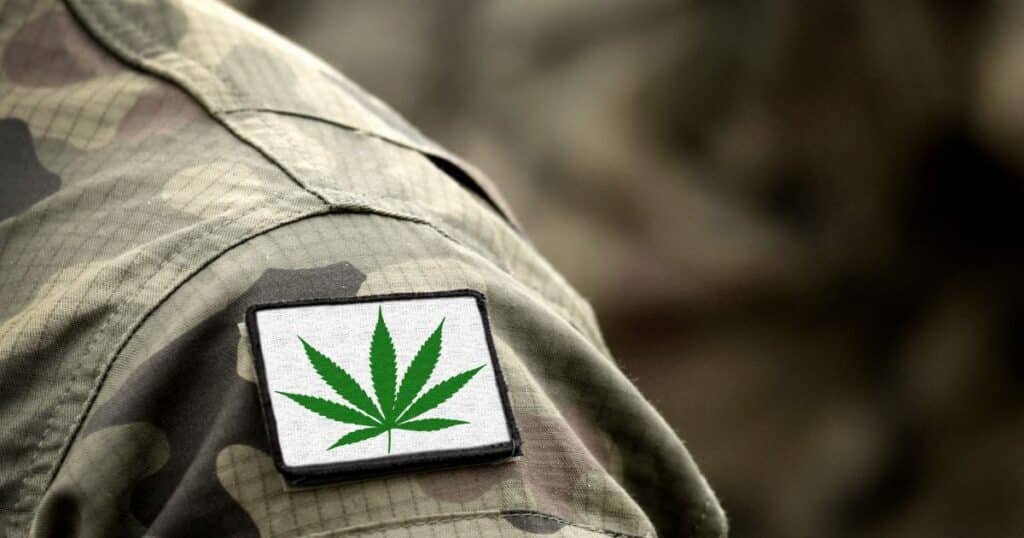The medicinal use of cannabis for veterans is an important and timely topic, given the current state of veteran mental health in the United States.
In recent years, a growing body of evidence suggests medicinal cannabis can provide relief for many conditions commonly experienced by U.S. veterans, including chronic pain, post-traumatic stress disorder (PTSD), anxiety, depression, and more.

A study published last month in the journal Clinical Therapeutics examined the use of medical cannabis among 510 U.S. veterans and found that 91% reported improved quality of life as a result.
The survey also revealed an association between race/ethnicity, gender identity, active combat experience, and substitution of prescription medications with medical cannabis use.
The implications of the findings point to a potential harm-reduction role of cannabis for veterans and should inform clinicians who work with this population.
General Findings of Study
The survey of 510 U.S. veterans found that 38% reported chronic pain, 26% suffered from post-traumatic stress disorder (PTSD), 9% reported having anxiety, and 5% suffered from depression.
67% of veterans in the study reported using cannabis daily, with 30% indicating they consumed the drug to reduce their use of over-the-counter medications, including antidepressants at 25%, anti-inflammatories at 17%, and other prescription medications.
Additionally, 91% of the veterans reported improved quality of life due to medical cannabis use, and 21% said they had reduced their usage of opioids as a result.
It is significant that among the participants, there was a higher likelihood for female and Black veterans – as well as those who served in active combat and experienced multiple deployments – to substitute medical cannabis for other medications.
This suggests that these populations are more likely to turn to medicinal cannabis as a form of self-medication, potentially because they have limited access to other forms of care or support.
It is clear from the study’s findings that medical cannabis can play a significant role in improving veterans’ quality of life and can be used as an alternative to prescription drugs and/or opioids. Therefore, policymakers and healthcare providers must recognize this potential benefit to ensure veteran patients receive adequate and appropriate treatment options.
The implications of the findings point to a potential harm-reduction role of cannabis for veterans and should inform clinicians who work with this population. By providing veterans with access to medical cannabis, clinicians can help them find relief for their conditions while reducing the risk of drug abuse or dependency on opioids.

This improved quality of life reported by veterans in this study is a powerful reminder that expanding access to cannabis and other psychedelics for veterans should be a no-brainer.
Cannabis and other psychedelic therapies have been proven to be effective alternatives for treating mental health disorders such as PTSD, anxiety, and depression, and veterans must receive adequate care utilizing these treatments. With proper regulation, training, and support from healthcare providers, veteran patients can benefit greatly from these treatments.
These findings demonstrate that medical cannabis can be an effective alternative for veterans suffering from various conditions, including chronic pain, PTSD, anxiety, depression, and more.
This improved quality of life reported by veterans in this study should be taken into consideration when considering expanding access to cannabis therapies for this population.
By providing veterans with access to medicinal cannabis and other psychedelic therapies via a well-regulated system with appropriate training and support from healthcare providers, we can ensure veteran patients receive adequate treatments while reducing the risk of drug abuse or dependency on opioids.
This should be a no-brainer for policymakers to improve the quality of life for veterans and ensure they have access to the treatments they need.
Correlates of Cannabis Use as a Substitute for Prescription Medication in Veterans
The survey revealed in great detail correlations between race/ethnicity, sex/gender identity, and active combat experience concerning the substitution of prescription medications for medical cannabis use.
Interestingly, those who had served in active combat and experienced multiple deployments were more likely to substitute their prescriptions with medical cannabis – suggesting that these populations may turn to the drug as a form of self-medication due to limited access to other forms of care or support.
These findings demonstrate the need for a closer examination of the role of medical cannabis for veterans, specifically those who have experienced active combat and multiple deployments.

By further exploring these correlations between cannabis use and health outcomes in this population, we can better understand how medical marijuana can improve veteran patients’ quality of life while reducing their usage of opioids.
Moreover, healthcare providers should be mindful of these correlations’ potential implications when prescribing medications to veterans.
Overall, the study has provided valuable insights into how medical cannabis can help improve the quality of life among U.S. veterans and reduce their dependency on prescription drugs and/or opioids. With proper regulation, training, and support from healthcare providers, cannabis and other psychedelic therapies can be effective alternative treatments for veterans suffering from various conditions.
This improved quality of life reported by veterans in this study should be taken into consideration when considering expanding access to cannabis therapies for this population.
It is clear that medical cannabis can play a major role in improving the quality of life for veterans and should be considered when discussing treatment options with veteran patients.
By providing veterans with access to medicinal cannabis and other psychedelic therapies via a well-regulated system, we can ensure they receive adequate care while reducing the risk of drug abuse or dependency on opioids.
Expanding access to these therapies for veteran patients should be a no-brainer for policymakers to improve their quality of life and ensure they have access to the treatments they need.
Enjoyed that first hit? Come chill with us every week at the Friday Sesh for a freshly packed bowl of the week’s best cannabis news!
Most Popular News Posts
- With Deep Roots in Cali’s Cannabis Culture, Circle Labs of Marin County Delivers High Grade Hemp Derived CBD
- Nationwide Decline of THC Levels in Legal Weed Reveals a Tsunami of Boof on the Horizon
- How Meme Culture Has Helped Shape Cannabis Culture in California & Beyond
- The Great California Cannabis Tax Scam Revealed




